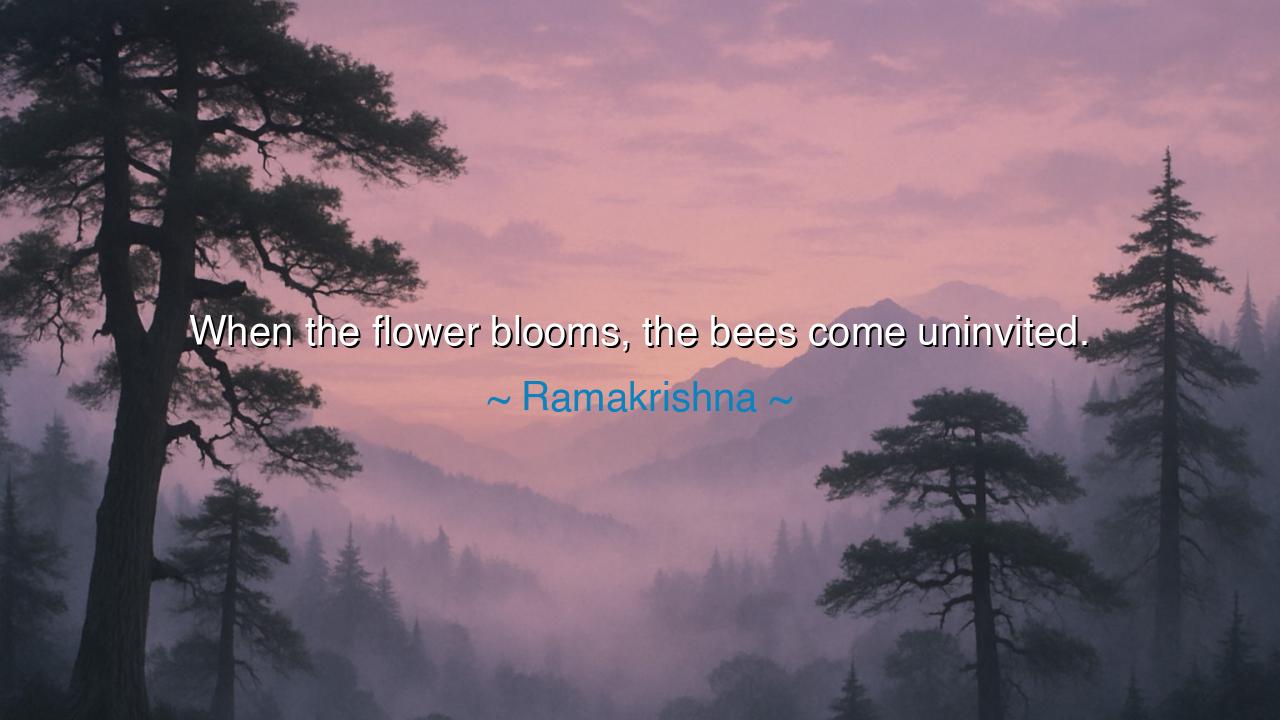
When the flower blooms, the bees come uninvited.






The great Indian mystic and saint Sri Ramakrishna once said: “When the flower blooms, the bees come uninvited.” In this brief yet luminous truth, he revealed the mystery of spiritual radiance, inner growth, and effortless attraction. The saying speaks not merely of gardens and nature, but of the soul itself. The flower is the awakened spirit, the noble character, or the realized heart that gives fragrance without demand. The bees are the blessings, the admirers, and the opportunities that naturally gather where beauty and authenticity reside. In this way, Ramakrishna teaches that one need not chase love, success, or recognition—one must only bloom, and the universe will come in response.
The origin of this wisdom rests in the soil of India’s spiritual tradition, where teachers taught that what is inwardly cultivated eventually manifests outwardly. Ramakrishna, a 19th-century mystic, lived a life of pure devotion and simplicity. He spoke not from books, but from the living experience of divine union. To him, the flowering of the soul was the highest act of life—a process of surrender, purification, and love. When a person reaches this state of inner flowering, the world need not be persuaded; it simply recognizes and gathers around that light. Just as a blooming lotus does not summon the bees, the soul in harmony with truth naturally draws all it needs.
This quote also speaks to the law of natural attraction, not in the modern sense of wishful thinking, but in the deeper spiritual sense that virtue, talent, and sincerity cannot remain hidden forever. When one tends to the garden of the self—watering it with discipline, weeding it with humility, and letting it bask in the sunlight of truth—sooner or later it must bloom. And when it does, success, friendship, and grace arrive on their own. The bees, representing worldly recognition or reward, are drawn by the fragrance of authenticity. Thus Ramakrishna reminds us: do not chase bees; nurture your flower.
A historical reflection of this truth can be seen in the life of Mother Teresa of Calcutta. She did not set out to be famous, nor did she seek worldly attention. She simply devoted herself to serving the poorest of the poor, performing small acts of love with great care. In time, her compassion became a fragrance that reached every corner of the world. People came—leaders, volunteers, and followers—drawn not by advertising or ambition, but by the irresistible beauty of her heart. Like Ramakrishna’s blooming flower, her goodness was its own summons.
The quote also offers a lesson for those who strive ceaselessly in worldly pursuits. Too often we chase approval, influence, or wealth without first cultivating the inner garden that sustains them. Ramakrishna’s words remind us that the power to attract lies not in pursuit, but in being. When the flower blooms, it does not run after bees—it simply fulfills its purpose, and nature responds. In life, this means that when we become excellent, kind, and true, opportunities find us. The effort should be directed inward—to bloom into our best selves—and not outward, to demand what has not yet been earned.
Spiritually, the saying reveals another layer of meaning. The blooming flower represents the soul in its union with the divine. When a heart is open, pure, and radiant with love, it becomes irresistible even to heaven itself. Grace, wisdom, and peace come to dwell in such a person naturally, without being sought. Ramakrishna often taught that divine realization does not come through outward struggle but through inner flowering. When the heart blossoms in truth, God—like the bee—comes uninvited.
The final lesson is both humble and empowering: focus on blooming, not on attracting. Do your work with sincerity. Cultivate your talents with patience. Nurture your heart with compassion. Do not concern yourself with recognition, for that is the work of the bees, not the flower. When the time is right, the fragrance of your goodness will draw to you everything meant to be yours. Live as the flower lives—rooted in faith, radiant with purpose, and generous with your beauty—and the world will find its way to your blossom.
For indeed, as Ramakrishna teaches, “When the flower blooms, the bees come uninvited.” True greatness, like true beauty, needs no pursuit. It simply becomes—and in its becoming, it blesses all who draw near.






AAdministratorAdministrator
Welcome, honored guests. Please leave a comment, we will respond soon